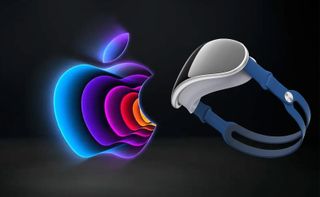Apple’s VR headset is a mystery wrapped in an enigma, and that’s what I like about it
Technology is at its most interesting when nobody knows where it's going.

In a parallel universe where Steve Jobs is still with us, he’s preparing for the big reveal of Apple’s AR/VR headset, most likely called the Apple Reality Pro. In his keynote he’ll make a wry joke about his own alleged reality distortion field, and then just like he did with the original iPhone he’ll summarise the headset in just three bullet points.
And that’s the bit of the keynote he’s having trouble with. The iPhone was easy: “An iPod. A phone. An internet mobile communicator.” But the headset… what is it? What is it for?
That’s why WWDC’s reveal is going to be fun. I don’t think Apple knows what it’s for, and that’s why it’s fascinating.
It's just history repeating
We’ve been here before. When Jobs took the stage again to unveil the original iPad in 2011, there wasn’t the same clarity as there was with the iPhone. Was the iPad more than just a really huge iPod touch? With hindsight, of course it was. But when it first launched, and for a long time afterwards, it seemed like hardware desperately seeking software: it was really nice, but what was it actually for?
Some early predictions – it was going to be big in ebooks, unseating Kindle from its place atop the e-reading throne - were way off the mark, and others didn’t see the future coming: today’s most popular free-to-install iPad apps are primarily video streaming, whether that’s Netflix, Disney+, YouTube or TikTok.
Something similar happened with the original Apple Watch. It’s interesting to look back at the first generation Apple Watch event because so much of the publicity around it focused on what it was rather than what it could do: there was a lot of talk around the Digital Crown and a lot less about the fitness and health features that would turn out to be more important, and live longer, than the Digital Touch that enabled you to send your heartbeat to someone else.
What Apple essentially did with the first generations of iPad and Apple Watch was to make them some sandwiches, tell them to wear sunscreen and send them off on adventures to see where they would end up. I think that’s a lesson learnt from the iPhone, which turned out rather differently from Apple’s original intentions: according to Steve Jobs’ biographer Walter Isaacson, Jobs was very opposed to having third-party apps on iPhone. According to CNBC (opens in new tab), Apple’s App Store grossed between $70 billion and $85 billion in 2022.

The Hitch-Hiker’s Guide to Apple
I’m reminded of legendary Apple fan Douglas Adams, whose Hitch-Hiker’s Guide To The Galaxy (opens in new tab) described the creation of a computer that would provide the answer to life, the universe and everything. You know this one: after many millennia, the ancestors of its creators were finally given the answer, and it was 42. It turns out that it wasn’t enough to know the answer. You needed to know the question too.
I’m pretty sure that the Reality Pro headset is Apple’s "42". It’s the answer to something, but right now I’m not convinced anybody knows what that something is. Could the killer app be VR FaceTime? Maybe. Or maybe it’s something a lot simpler, like being able to lie back and stream TikTok. Maybe it’s 3D sports where you can feel like you’re right there in the stadium. Or maybe it’s an alternative to having three giant monitors for your Mac. Maybe it’s all of these things, or none of them, or other things entirely.
Nobody knows anything
I don’t think anybody knows where the Reality Pro will end up taking us, and I think that’s fascinating. It’s fascinating because it means we’re almost certainly going to see something surprising emerge, something that with hindsight is going to seem incredibly obvious but isn’t right now – just like iPads being many people’s TVs, or iPhones having an App Store. They weren’t obvious at first either.
That’s what I love so much about tech. I love it when it surprises me, when it delights me, when it not only makes my life more interesting and entertaining but also creates new experiences I’ll soon wonder how I managed without. And that’s where I think the Reality devices are heading – maybe not with the first generation, but over a fairly short space of time.
I think the Reality is Apple’s next iPad, a device that establishes a new kind of computing – and yes, other people have made headsets, just as Microsoft beat Apple to tablets; but there’s one market leader in tablet computing and it isn’t Microsoft – that takes some time to emerge. If you go back and look at the OG iPad’s hardware, software and available apps it doesn’t feel like it’s from a decade ago; it feels like it’s from a lifetime ago. And in tech terms, it is. Just as the Reality Pro will be when we look back at it in 2033.
Although hopefully by then it’ll be a hell of a lot cheaper.
Get more iMore in your inbox!
Our news, reviews, opinions, and easy to follow guides can turn any iPhone owner into an Apple aficionado
Writer, broadcaster, musician and kitchen gadget obsessive Carrie Marshall (Twitter) has been writing about tech since 1998, contributing sage advice and odd opinions to all kinds of magazines and websites as well as writing more than a dozen books. Her memoir, Carrie Kills A Man (opens in new tab), is on sale now. She is the singer of the Glaswegian rock band HAVR (opens in new tab).
